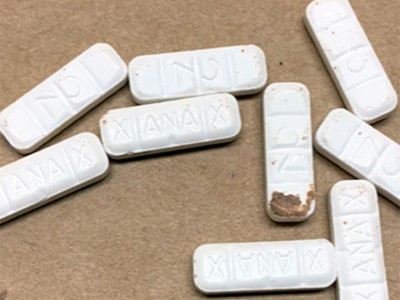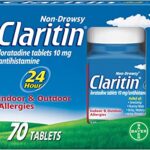Can Expired Xanax Hurt You?

Xanax is a brand of alprazolam, an antianxiety medication in the benzodiazepine family. Xanax works by decreasing abnormal excitement in the brain. The Food and Drug Administration (FDA) approved it in October 1981. Xanax is used to treat anxiety and panic disorders.
Benzodiazepines act on the brain and central nervous system (CNS) to produce a calming effect. Xanax slows down the movement of brain chemicals that may have become unbalanced, resulting in a reduction in nervous tension and anxiety. Xanax works by boosting the effects of a natural chemical called gamma-aminobutyric acid, which is made in the brain.
How should Xanax be used?
Alprazolam comes as a tablet, an extended-release tablet, an orally disintegrating tablet (tablet that dissolves quickly in the mouth), and a concentrated solution (liquid) to take by mouth. The tablet, orally disintegrating tablet, and concentrated solution usually are taken two to four times a day. The extended-release tablet is taken once daily, usually in the morning. Follow the directions on your prescription label carefully, and ask your doctor or pharmacist to explain any part you do not understand. Take alprazolam exactly as directed.
To take the concentrated liquid, use only the dropper that came with your prescription. Draw into the dropper the amount prescribed for one dose. Squeeze the dropper contents into a liquid or semisolid food such as water, juice, soda, applesauce, or pudding. Stir the liquid or food gently for a few seconds. The concentrated liquid will blend completely with the food. Drink or eat the entire mixture immediately. Do not store for future use.
Remove the orally disintegrating tablet from the bottle just before it is time for your dose. With dry hands, open the bottle, remove the tablet, and immediately place it on your tongue. The tablet will dissolve and can be swallowed with saliva. The orally disintegrating tablet can be taken with or without water. Swallow the extended-release tablets whole; do not chew, crush, or break them.
Your doctor will probably start you on a low dose of alprazolam and gradually increase your dose, not more than once every 3 or 4 days.
Does Xanax Expire?
Yes, Xanax can expire. An expiration date is a date after which a consumable product such as food or medicine should not be used because it may be spoiled, damaged, or ineffective. Expiration dates are especially important for medications because they offer the only indication about whether the product is still safe to use
In the late 1970s, the United States Food and Drug Administration (FDA) mandated that all prescription and over-the-counter (OTC) medical products contain an expiration date. Expiration dates for medicines are often marked “EXP” and are printed on the label or stamped onto the medicine bottle or box.
Can expired Xanax hurt you?
Yes, expired Xanax can hurt you because it is less effective and risky due to a change in chemical composition or a decrease in strength. The expiration date is the final day that the manufacturer guarantees the full potency and safety of a medication. Drug expiration dates exist on most medication labels, including prescription, over-the-counter (OTC) and dietary (herbal) supplements. U.S. pharmaceutical manufacturers are required by law to place expiration dates on prescription products prior to marketing.
Certain expired medications are at risk of bacterial growth and a sub-potent Xanax can fail to treat anxiety and panic disorders, leading to more serious illnesses. Once the expiration date has passed (usually two to three years after the date of manufacture) there is no guarantee that the medicine will be safe and effective. If your Xanax has expired, do not use it. Even though some controversial studies indicate that some drugs can be used after expiry dates, it is better to err on the side of caution in order not to complicate your health condition or trigger unwanted adverse effects.
Some possible side effects of Xanax include:
• drowsiness
• lightheadedness
• low energy
• depression
• headache
• confusion
• insomnia
• nervousness
• fainting
• dizziness
• restlessness
• impaired coordination
• irritability
• memory impairment
• anxiety
• abnormal involuntary movement
• decreased libido
• confusion
• muscle twitching and cramps
• increased libido
• a dry mouth or increased saliva
• constipation or diarrhea
• nausea and vomiting
• inflammation of the skin due to allergy
• rash
• tachycardia or heart palpitations
• chest pain
• hyperventilation
• nasal congestion
• hypotension
• blurred vision
• menstrual disorders
• tinnitus
• upper respiratory infection
• sweating
• weakness
• abnormal dreams
• fear
• rigidity
• tremor
• increased or decreased appetite
• weight gain or loss
• edema
• slurred speech
• incontinence.
The above is not a complete list of side effects, and others may occur. Call a doctor for medical advice about side effects. People can also report any Xanax side effects they experience to the FDA at 800-332-1088.
Note: An expired Xanax can still interact with other medications which include: azole antifungals (such as itraconazole, ketoconazole), cimetidine, certain anti-depressants (such as fluoxetine, fluvoxamine, nefazodone), drugs to treat HIV (delavirdine, protease inhibitors such as indinavir), macrolide antibiotics (such as erythromycin), rifamycins (such as rifabutin), St. John’s wort, drugs used to treat seizures (such as phenytoin), among others.
The risk of serious side effects (such as slow/shallow breathing, severe drowsiness/dizziness) may be increased if this medication is taken with other products that may also cause drowsiness or breathing problems.
Tell your doctor or pharmacist if you are taking other products such as opioid pain or cough relievers (such as codeine, hydrocodone), alcohol, marijuana (cannabis), other drugs for sleep or anxiety (such as diazepam, lorazepam, zolpidem), muscle relaxants (such as carisoprodol, cyclobenzaprine), or antihistamines (such as cetirizine, diphenhydramine).
What to do with expired Xanax?
The CDC reports that 50,000 young children end up in emergency rooms each year because they got into medicines while an adult wasn’t looking. Expired medicines are also not just a risk to the person they were prescribed for and can injure children and pets if taken by mistake. For all these reasons, proper disposal of unneeded medicines is essential.
Keep this medication in the container it came in, tightly closed, and out of reach of children. Store it at room temperature and away from excess light, heat and moisture (not in the bathroom).
It is important to keep all medication out of sight and reach of children as many containers (such as weekly pill minders and those for eye drops, creams, patches, and inhalers) are not child-resistant and young children can open them easily. To protect young children from poisoning, always lock safety caps and immediately place the medication in a safe location – one that is up and away and out of their sight and reach. http://www.upandaway.org
Unneeded medications should be disposed of in special ways to ensure that pets, children, and other people cannot consume them. However, you should not flush this medication down the toilet. Instead, the best way to dispose of your medication is through a medicine take-back program. Talk to your pharmacist or contact your local garbage/recycling department to learn about take-back programs in your community. See the FDA’s Safe Disposal of Medicines website (http://goo.gl/c4Rm4p) for more information if you do not have access to a take-back program.
A place for everything
Proper storage is one way to help make sure your medicines will remain safe and effective up to their expiration date. Be sure to read the label to see if there are specific storage instructions for your medicine. Certain medicines need to be stored in the refrigerator and others cannot be exposed to high temperatures. Improper storage – such as a damp bathroom cabinet – can contribute to decreased effectiveness in medicines that have not reached their posted expiration date. For most medicines, to help ensure the proper shelf life of your medicine, it is better to store medicine in a cool, dry place such as a dresser drawer, storage box, closet shelf, or kitchen cabinet.
When storing medicine in a kitchen cabinet, make sure that it is away from hot appliances and the sink due to changing temperatures and humidity which can affect the medicine. When storing medicine in a high traffic area like a kitchen, care should be taken to prevent access by children at risk of accidental poisoning or others who may be tempted to take for abuse/misuse.
Remember to store medicines properly and don’t use expired medicines, it’s not worth the risk!





